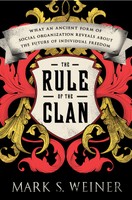What Modern Democracies Should Understand About Clan-based Societies Explored in New Book by Rutgers–Newark Law Professor
Those committed to the values of individual freedom and self-development would do well to understand the legal and social structures of clan-based societies and their relationship to governments based on the rule of law.
For as legal historian Mark S. Weiner argues in The Rule of the Clan: What an Ancient Form of Social Organization Reveals About the Future of Individual Freedom (Farrar, Straus and Giroux, March 2013), the success of democratic ideals requires not only a robust state but also an appreciation for the benefits provided its members by clan societies. “When we fail to understand the clan heritage of a great many of our enemies,” Weiner writes, “their motivation for taking up arms against us in the first place will remain obscure.”

People are valued less as individuals than as members of extended family groups. Group honor is a paramount value, enabling kin groups to enforce their own internal rules and diverse kin groups to coexist in some degree of harmony. Yet clan societies’ combination of primary allegiance to the kin group and absence of a strong central authority creates a significant potential for destabilizing vital regions of the world.
Understanding the rule of the clan is critical for liberals for several reasons, says Weiner. (He defines liberals as “people committed to the values of individualism and the principles of liberal democratic government, regardless of party affiliation.”) Most importantly, by illuminating the way in which clan societies diminish the status of the individual, the rule of the clan shows that a robust central state, dedicated to the public interest, is essential to true individual freedom. “A decline in the state,” Weiner writes, “would bring chaos and catastrophe for individualism just as a decline of American power would be disastrous for the prospects of democratic development.”
Stanford University professor Ian Morris, author of Why the West Rules – for Now, says of The Rule of the Clan: “This book tells us what we need to know if we really want to modernize the clan societies of the Middle East and central Asia – and if we want to save our own liberal democracies from descending into clannish chaos.”
Professor Weiner is the author of two prize-winning books: Black Trials: Citizenship From the Beginnings of Slavery to the End of Caste (Alfred A. Knopf), which received a 2005 Silver Gavel Award from the American Bar Association, and Americans without Law: The Racial Boundaries of Citizenship (NYU Press), winner of the Social Science History Association President’s Book Award.
Professor Weiner received an A.B. from Stanford University, a J.D. from Yale Law School and a Ph.D. in American Studies from Yale University. He joined Rutgers School of Law–Newark in 2001 and taught classes in constitutional law and legal history.
An admired teacher who twice was selected by the graduating class as faculty commencement speaker, Weiner spent the fall of 2009 as a Fulbright Fellow at the University of Akureyi, Iceland. It was there that he began the kinship research for The Rule of the Clan. It also was in Iceland that, freed from the three-hour commute between office and home and charmed by the slower life, Weiner first considered relinquishing his law professor job. The decision to become a full-time scholar, effective the end of the current academic year, is detailed on his website, www.worldsoflaw.com.
Media Contact: Janet Donohue
973-353-5553
E-mail: jdonohue@andromeda.rutgers.edu